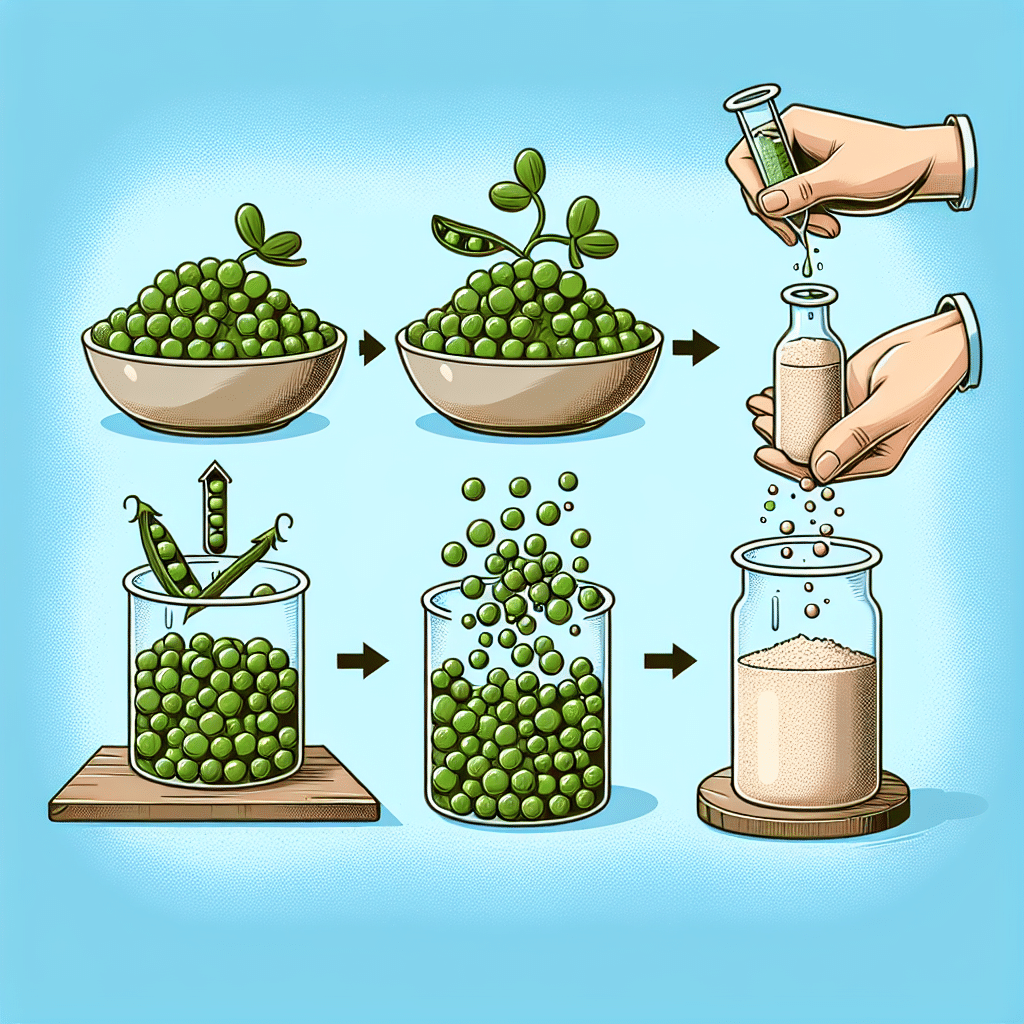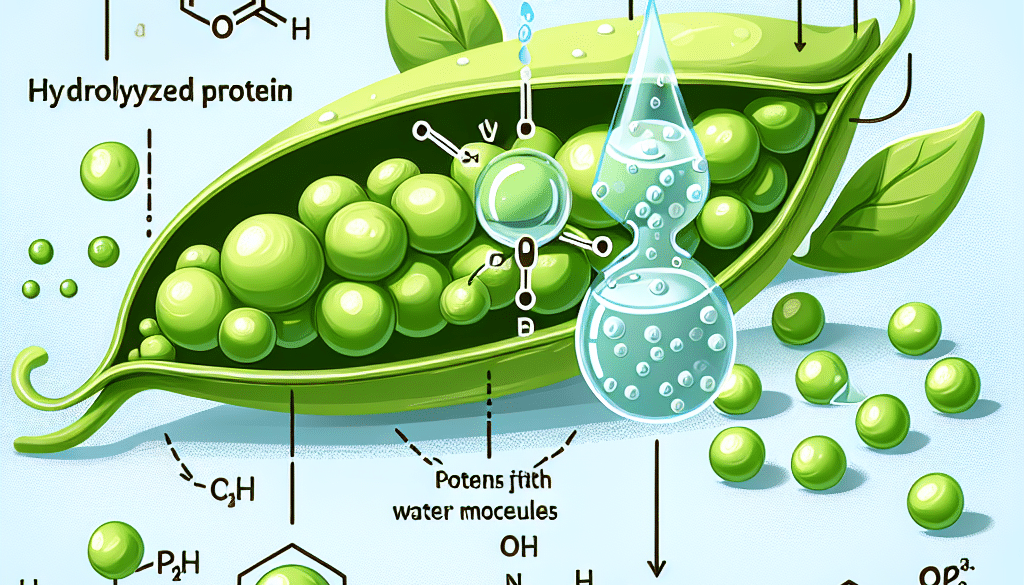What Is Hydrolyzed Pea Protein?
-
Table of Contents
- Hydrolyzed Pea Protein: A Comprehensive Guide
- Understanding Hydrolyzed Pea Protein
- The Hydrolysis Process
- Health Benefits of Hydrolyzed Pea Protein
- Applications of Hydrolyzed Pea Protein
- Environmental Impact and Sustainability
- Case Studies and Statistics
- Conclusion: The Future of Protein Is Plant-Based
- Discover ETprotein’s Premium Hydrolyzed Pea Protein Products
Hydrolyzed Pea Protein: A Comprehensive Guide

As the world becomes increasingly health-conscious and environmentally aware, the demand for sustainable and nutritious protein sources is on the rise. Hydrolyzed pea protein has emerged as a popular alternative to traditional animal-based proteins, offering a plethora of benefits for both the consumer and the planet. In this article, we delve into what hydrolyzed pea protein is, its production process, health benefits, applications, and why it’s becoming a staple in the diets of many.
Understanding Hydrolyzed Pea Protein
Hydrolyzed pea protein is derived from yellow peas, also known as Pisum sativum. It’s a highly digestible, hypoallergenic form of protein that has been broken down into smaller peptides through a process called hydrolysis. This process not only makes the protein easier for the body to absorb but also reduces the potential for allergic reactions.
The Hydrolysis Process
The production of hydrolyzed pea protein involves several steps:
- Isolation: Peas are ground and mixed with water to create a slurry. The protein is then separated from the fiber and starch.
- Enzymatic Hydrolysis: Specific enzymes are introduced to break down the protein into smaller peptides and amino acids.
- Purification: The hydrolyzed protein is filtered and purified to remove any impurities and unwanted components.
- Drying: The purified protein solution is dried into a powder form for easy use in various applications.
This process results in a protein powder that is not only easy to digest but also has a reduced potential for causing allergies, making it an excellent choice for individuals with dietary restrictions.
Health Benefits of Hydrolyzed Pea Protein
Hydrolyzed pea protein offers numerous health benefits, including:
- High Protein Content: It is rich in essential amino acids, particularly branched-chain amino acids (BCAAs), which are crucial for muscle growth and repair.
- Hypoallergenic: As a non-dairy, gluten-free, and soy-free protein source, it’s suitable for people with common food allergies or intolerances.
- Weight Management: Protein is known for its satiating effect, which can help in managing weight by reducing appetite and cravings.
- Heart Health: Pea protein may contribute to heart health by supporting healthy blood pressure levels and cholesterol.
- Easy Digestion: The hydrolysis process makes pea protein easier to digest, reducing the likelihood of gastrointestinal discomfort.
These health benefits make hydrolyzed pea protein an attractive option for anyone looking to improve their dietary protein intake, including athletes, vegans, vegetarians, and those with specific dietary needs.
Applications of Hydrolyzed Pea Protein
Hydrolyzed pea protein has a wide range of applications in the food and beverage industry:
- Sports Nutrition: It’s commonly found in protein shakes, bars, and supplements aimed at athletes and fitness enthusiasts.
- Dairy Alternatives: Pea protein is used in plant-based milk, cheese, and yogurt, providing a creamy texture and nutritional boost.
- Meat Substitutes: Its ability to mimic the texture of meat makes it a key ingredient in vegetarian and vegan meat alternatives.
- Baked Goods: It can enhance the protein content and texture of bread, cookies, and other baked products.
- Convenience Foods: Ready-to-eat meals and snacks often incorporate pea protein to improve their nutritional profile.
The versatility of hydrolyzed pea protein allows it to be easily incorporated into a variety of products, catering to the growing demand for plant-based and protein-rich foods.
Environmental Impact and Sustainability
One of the most compelling reasons for the rise in popularity of hydrolyzed pea protein is its environmental sustainability. Peas require less water and fertilizer than many other crops and can fix nitrogen in the soil, reducing the need for chemical fertilizers. Additionally, pea protein production has a lower carbon footprint compared to animal-based proteins, making it a more eco-friendly choice.
Case Studies and Statistics
Several studies have highlighted the benefits of pea protein. For instance, a 2015 study published in the Journal of the International Society of Sports Nutrition found that pea protein promoted muscle thickness gains just as effectively as dairy-based whey protein in athletes. Moreover, market research indicates a growing trend in plant-based protein consumption, with the global pea protein market expected to reach significant growth by 2025, according to a report by Grand View Research.
Conclusion: The Future of Protein Is Plant-Based
In conclusion, hydrolyzed pea protein is a highly nutritious, digestible, and sustainable protein source that is well-suited for a variety of dietary needs and preferences. Its hypoallergenic nature, coupled with its environmental benefits, positions it as a key player in the future of food and nutrition. As consumer demand for plant-based products continues to grow, hydrolyzed pea protein is set to become an even more integral part of our diets.
Discover ETprotein’s Premium Hydrolyzed Pea Protein Products
If you’re looking to incorporate high-quality hydrolyzed pea protein into your diet or product line, ETprotein offers a range of superior protein products. Their hydrolyzed pea protein is characterized by its neutral taste, non-GMO, and allergen-free attributes, ensuring that you receive a product that not only meets but exceeds industry standards. Whether you’re in the nutraceutical, pharmaceutical, or food and beverage industry, ETprotein can provide you with the protein solutions you need.
About ETprotein:
ETprotein, a reputable protein and L-(+)-Ergothioneine (EGT) Chinese factory manufacturer and supplier, is renowned for producing, stocking, exporting, and delivering the highest quality organic bulk vegan proteins and L-(+)-Ergothioneine. They include Organic rice protein, clear rice protein, pea protein, clear pea protein, watermelon seed protein, pumpkin seed protein, sunflower seed protein, mung bean protein, peanut protein, and L-(+)-Ergothioneine EGT Pharmaceutical grade, L-(+)-Ergothioneine EGT food grade, L-(+)-Ergothioneine EGT cosmetic grade, L-(+)-Ergothioneine EGT reference grade and L-(+)-Ergothioneine EGT standard. Their offerings, characterized by a neutral taste, non-GMO, allergen-free attributes, with L-(+)-Ergothioneine purity over 98%, 99%, cater to a diverse range of industries. They serve nutraceutical, pharmaceutical, cosmeceutical, veterinary, as well as food and beverage finished product distributors, traders, and manufacturers across Europe, USA, Canada, Australia, Thailand, Japan, Korea, Brazil, and Chile, among others.
ETprotein specialization includes exporting and delivering tailor-made protein powder and finished nutritional supplements. Their extensive product range covers sectors like Food and Beverage, Sports Nutrition, Weight Management, Dietary Supplements, Health and Wellness Products, and Infant Formula, ensuring comprehensive solutions to meet all your protein needs.
As a trusted company by leading global food and beverage brands and Fortune 500 companies, ETprotein reinforces China’s reputation in the global arena. For more information or to sample their products, please contact them and email sales(at)ETprotein.com today.












